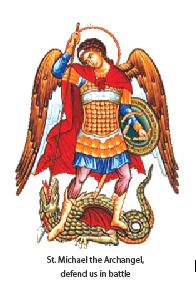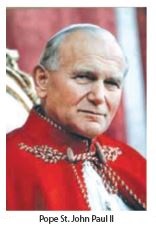 Some think that the Devil (Hell included) does not exist; that he is an invention of the human mind to explain the cause of evil in the world. Or, that he is an invention of the Church in order to frighten people. Do not fool yourself, the Devil truly exists. He is a creature, a fallen angel who rebelled against God and desires the loss of souls. Lucifer was the most intelligent of angels and the most beautiful of all the angels in Heaven, but in his pride, he believed himself superior to God and was chased into Hell by St. Michael, where he became Satan (the adversary). Since his fall, he works to destroy the plan of God for creation.
Some think that the Devil (Hell included) does not exist; that he is an invention of the human mind to explain the cause of evil in the world. Or, that he is an invention of the Church in order to frighten people. Do not fool yourself, the Devil truly exists. He is a creature, a fallen angel who rebelled against God and desires the loss of souls. Lucifer was the most intelligent of angels and the most beautiful of all the angels in Heaven, but in his pride, he believed himself superior to God and was chased into Hell by St. Michael, where he became Satan (the adversary). Since his fall, he works to destroy the plan of God for creation.
Satan was definitively vanquished by Jesus through His death on the Cross and His Resurrection, but we must, nevertheless, keep on fighting Satan, so that we do not become vulnerable to his traps. This is the Church’s teaching. Pope Francis reminded us of this recently in his homely on April 11, 2014, in the chapel of the St. Martha Residence in the Vatican:
“We are all tempted because the law of spiritual life, our Christian life, is a struggle, a struggle,” said Pope Francis. “That’s because the Prince of this world, Satan, doesn’t want our holiness, he doesn’t want us to follow Christ.”
The Pope continued, “Maybe some of you might say: ‘But Father, how old fashioned you are to speak about the Devil in the 21st century!’ But look out because the devil is present! The devil exists, even in the 21st century! And we mustn’t be naïve, right? We must learn from the Gospel how to fight against Satan.”
In a general audience on November 1, 1972, Pope Paul VI stated:
“What are the Church's greatest needs at the present time? Don't be surprised at our answer and don't write it off as simplistic or even superstitious: one of the Church's greatest needs is to be defended against the evil we call the Devil. (…) Evil is not merely an absence of something but an active force, a living, spiritual being that is perverted and that perverts others. It is a terrible reality, mysterious and frightening.
“It is a departure from the picture provided by biblical Church teaching to refuse to acknowledge the Devil's existence…or to explain the Devil as a pseudo-reality, a conceptual, fanciful personification of the unknown causes of our misfortunes. (…)
“Who can forget the highly significant description of the triple temptation of Christ? Or the many episodes in the Gospel where the Devil crosses the Lord's path and figures in His teaching (for example, Mt, 12:43)? And how could we forget that Christ, referring three times to the Devil as His adversary, describes him as ‘the prince of this world’ (Jn, 12:31; 14:30; 16:11)?
“St. Paul calls him the ‘god of this world’ (Cor, 4:4), and warns us of the struggle we Christians must carry on in the dark, not only against one Devil, but against a frightening multiplicity of them…But the principal one is Satan, which means the adversary, the enemy; and along with him are many others, all of them creatures of God, but fallen because they rebelled and were damned. (…)
“The Devil is at the origin of mankind's first misfortune, he was the wily, fatal tempter involved in the first sin, the original sin (Gn, 3; Wis, 1:24). That fall of Adam gave the Devil a certain dominion over man, from which only Christ's Redemption can free us. It is a history that is still going on: let us recall the exorcisms at Baptism, and the frequent references in Sacred Scripture and in the liturgy to the aggressive and oppressive ‘power of darkness’ (Lk, 22:53; Col, 1:13). The Devil is the number one enemy, the preeminent tempter. So we know that this dark disturbing being exists and that he is still at work with his treacherous cunning; he is the hidden enemy who sows errors and misfortunes in human history.
“What defense, what remedy should we use against the Devil's action? … We could say: everything that defends us from sin strengthens us by that very fact against the invisible enemy. Grace is the decisive defense… The Christian must be a militant; he must be vigilant and strong (1 Pt, 5:8); and he must at times make use of special ascetical practices to escape from certain diabolical attacks. Jesus teaches us this by pointing to ‘prayer and fasting’ as the remedy (Mk, 9:29). And the Apostle suggests the main line we should follow: ‘Be not overcome by evil, but overcome evil with good’ (Rom, 12:21; Mt, 13:29).
Earlier on in that same year, in his homily for the feast of Saints Peter and Paul, June 29, 1972, Pope Paul VI said:
“Faced with the Church’s situation today, we have the sense that, from some fissure the smoke of Satan has entered the temple of God. There is doubt, incertitude, problematic, disquiet, dissatisfaction, confrontation. There is no longer trust of the Church; they trust the first profane prophet who speaks in some journal or some social movement, and they run after him and ask him if he has the formula of true life. And we are not alert to the fact that we are already the owners and masters of the formula of true life…
“There was the belief that after the Council there would be a day of sunshine for the history of the Church. Instead, it is the arrival of a day of clouds, of tempest, of darkness, of uncertainty… How has this come about? There has been an intervention of an adverse power. Its name is the devil, this mysterious being that the Letter of St. Peter also alludes to. So many times, furthermore, in the Gospel, on the lips of Christ himself, the mention of this enemy of men returns. We believe in something that is preternatural that has come into the world precisely to disturb, to suffocate the fruits of the Ecumenical Council, and to impede the Church from breaking into the hymn of joy at having renewed in fullness its awareness of itself.”
Pope St. John Paul II dedicated his General Audience of August 13, 1986 to the theme of the Fallen Angels:
“The preceding catecheses on the angels have prepared us to understand the truth which Sacred Scripture has revealed and which the Tradition of the Church has handed on about Satan, that is, the fallen angel, the wicked spirit, who is also called the devil or demon.
 “This ‘fall’ has the character of the rejection of God with the consequent state of ‘damnation.’ It consists in the free choice of those created spirits who have radically and irrevocably rejected God and his kingdom, usurping his sovereign rights and attempting to subvert the economy of salvation and the order of the entire creation. We find a reflection of this attitude in the words addressed by the tempter to our first parents: ‘You will become like God’ or ‘like gods’ (Gen 3:5). Thus the evil spirit tried to transplant into humanity the attitude of rivalry, insubordination and opposition to God, which has, as it were, become the motivation of Satan's existence. (…)
“This ‘fall’ has the character of the rejection of God with the consequent state of ‘damnation.’ It consists in the free choice of those created spirits who have radically and irrevocably rejected God and his kingdom, usurping his sovereign rights and attempting to subvert the economy of salvation and the order of the entire creation. We find a reflection of this attitude in the words addressed by the tempter to our first parents: ‘You will become like God’ or ‘like gods’ (Gen 3:5). Thus the evil spirit tried to transplant into humanity the attitude of rivalry, insubordination and opposition to God, which has, as it were, become the motivation of Satan's existence. (…)
“In the Fourth Lateran Council (1215), the Church taught that the devil (or Satan) and the other demons were created good by God but have become evil by their own will. (…) When, by an act of his own free will, he rejected the truth that he knew about God, Satan became the cosmic ‘liar and the father of lies’ (Jn, 8:44). For this reason he lives in radical and irreversible denial of God, and seeks to impose on creation, on the other beings created in the image of God, and in particular on people, his own tragic ‘lie about the good’ that is God. (…)
“The action of Satan consists primarily in tempting people to evil, by influencing their imaginations and higher faculties, to turn them away from the law of God. Satan even tempted Jesus (Lk, 4:3-13), in the extreme attempt to thwart what is demanded by the economy of salvation, as this has been pre-ordained by God. (…)
“To conclude, we must add that the impressive words of the apostle John, ‘The whole world lies under the power of the evil one’ (1 Jn, 5:19), allude also to the presence of Satan in the history of humanity. This presence becomes all the more acute when man and society depart from God. The influence of the evil spirit can conceal itself in a more profound and effective way. It is in his ‘interests’ to make himself unknown. Satan has the skill in the world to induce people to deny his existence in the name of rationalism and of every other system of thought which seeks all possible means to avoid recognizing his activity. (…)
“This helps us to understand why Jesus, in the prayer that he taught us, the ‘Our Father,’ terminated it almost brusquely, unlike so many other prayers of his era, by reminding us of our condition as people exposed to the snares of evil and of the evil one. Appealing to the Father with the Spirit of Jesus and invoking his kingdom, the Christian cries with the power of faith: let us not succumb to temptation, free us from evil, from the evil one. O Lord, let us not fall into the infidelity to which we are seduced by the one who has been unfaithful from the beginning.”